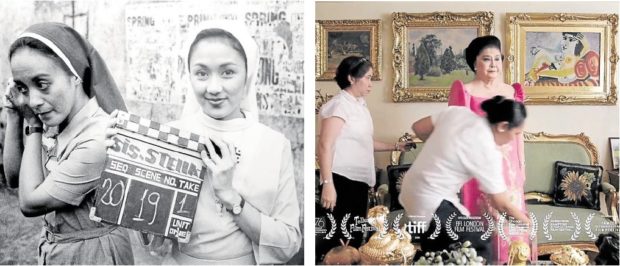
LANDMARK FILMS Actors Laurice Guillen and Vilma Santos play activist nuns on the set of Mike de Leon’s politically charged drama “Sister Stella L.,” which was released in 1984 amid a state of unrest that marked the twilight of the Marcos regime; screengrab of “The Kingmaker,” US filmmaker Lauren Greenfield’s documentary on Imelda Marcos, which was screened at the Active Vista International Human Rights Festival coinciding with the 48th commemoration of the Sept. 23, 1972, declaration of martial law. —CESAR HERNANDO’S PHOTOGRAPH COURTESY OF LUZVIMINDA.PH
MANILA, Philippines — To correct false narratives about the brutal Marcos regime that continue to thrive on social media, artists and activists have turned to cinema to gain ground in the battle for hearts and minds against historical denialism.
As the Philippines commemorates the 48th anniversary of the formal declaration of martial law on Wednesday, Filipinos are urged to watch a variety of films tackling social issues — from military rule to police brutality—in online festivals staged by artist groups starting this week.
The artist-activist group Dakila-Philippine Collective for Modern Heroism launched on Saturday the eighth edition of its Active Vista International Human Rights Festival, an annual event that celebrates “rights, freedoms and dignity through stories of human struggle.” The festival runs until Sept. 26.
‘Bring focus to narratives’
Apart from film screenings, the human rights festival showcases a series of forums on social issues, particularly on demagoguery and disinformation.With the Philippines battered by the coronavirus pandemic and the government weaponizing the lockdown to further suppress civil liberties, the festival will “nurture transformative ideas to make meaningful change happen,” Active Vista executive director Leni Velasco said in a statement.
This year’s festival “20/20” film screenings hope to “bring focus to narratives of different colors and stories at the margins of our sight to see the world in 20/20—with an awareness of those in the peripherals.”
Front-lining the festival is Lauren Greenfield’s “The Kingmaker,” which follows the political career of former first lady Imelda Marcos and her family’s continuing power and influence; James Jones and Olivier Sabil’s “On the President’s Orders,” which showed the Caloocan police station under the leadership of then Senior Supt. Jemar Modequillo at the height of the drug war; Hans Block and Moritz Riesewieck’s “The Cleaners,” and Lav Diaz’s “Ang Panahon ng Halimaw.”
No festival of martial law-era films is complete without timeless classics like “Dekada 70” by Chito S. Roño; Peque Gallaga’s “Oro Plata Mata,” Ricky Lee’s “Moral” and Ishmael Bernal’s “Himala.”
The last three films were screened in 1982, a year after dictator Ferdinand Marcos formally lifted martial law across the country.
Zeitgeist films
It was not until the assassination of Marcos’s rival, former Sen. Benigno Aquino Jr., a year later that the protest movement against Marcos gained new momentum.
Two landmark films that caught the zeitgeist of Philippine society after the Aquino assassination were Lino Brocka’s “Kapit sa Patalim” and Mike de Leon’s “Sister Stella L.,” both released in 1984 and written by renowned poet, journalist and screenwriter Jose “Pete” Lacaba.
‘Witnesses, storytellers of truth’Brocka’s film is undergoing restoration; De Leon’s allegorical “Kisapmata” was recently restored.
“In a time when our focus becomes blurry as a plethora of societal and political chaos surmount us, now more than ever must our roles as witnesses and storytellers of truth and resistance remain,” said Dakila communications director Andrei Venal.